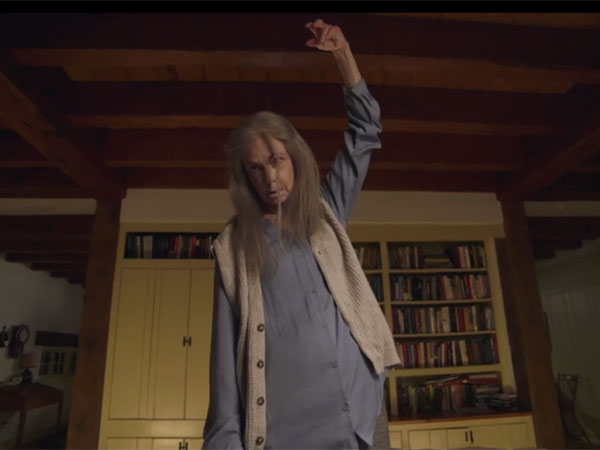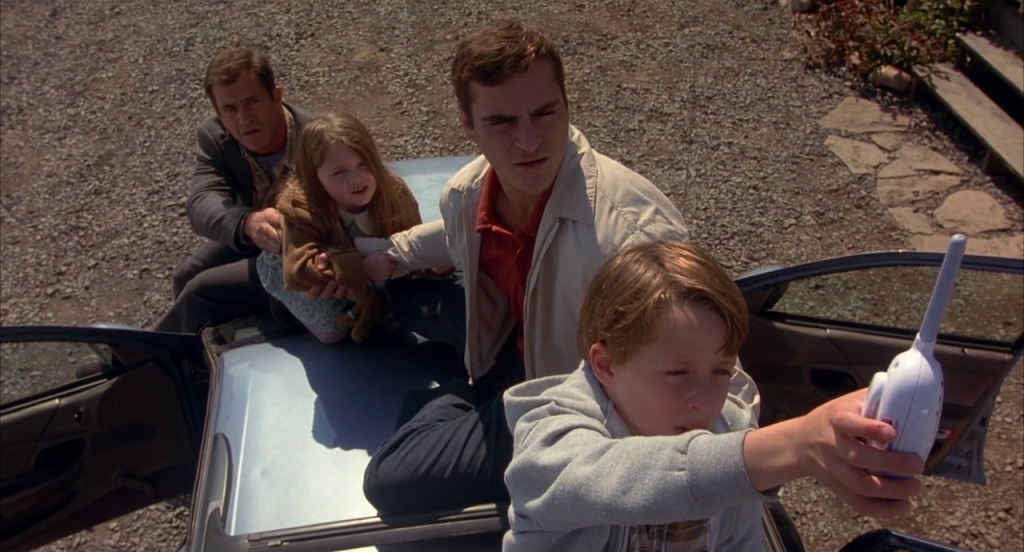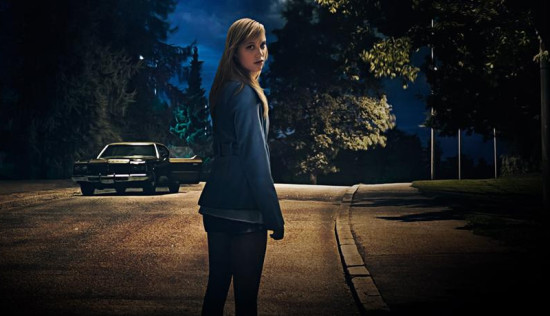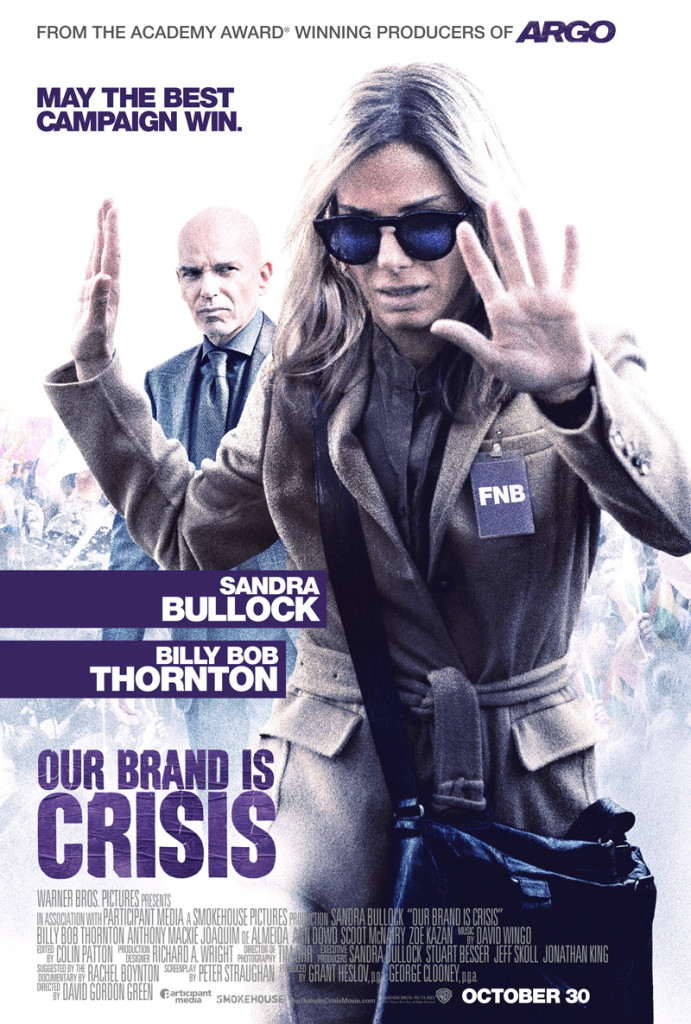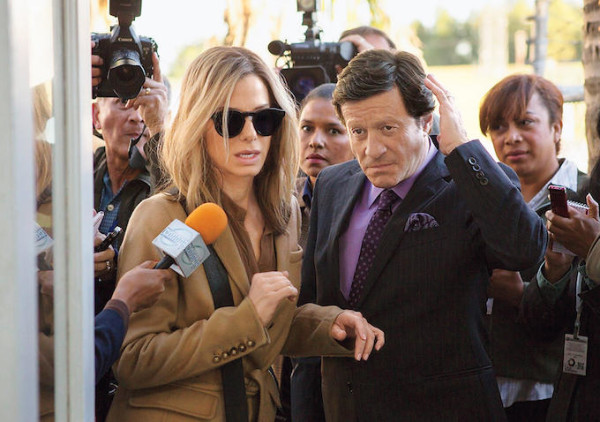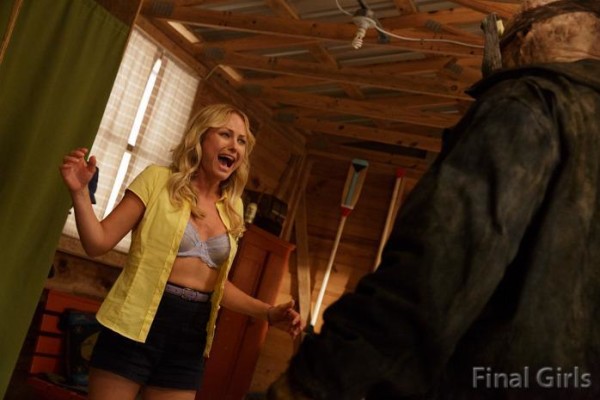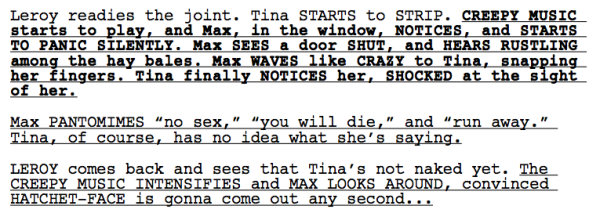M. Night’s new film shocks with a bigger than expected opening. But is this a “visit” worth taking?
Genre: Horror
Premise: (from IMDB) A single mother finds that things in her family’s life go very wrong after her two young children visit their grandparents.
About: You’ve loved him, you’ve hated him, you’ve laughed with him and you’ve laughed at him. And whether you like it or not, the once pop-culture directing icon (The Sixth Sense, The Happening, Signs) is back with a new film. Yes, I’m talking about M. Night Shyamalan. Night has sunk so low in the eyes of the paying public that he’s been forced to play by Hollywood’s new horror-film rules: 1) Get a hall pass from Jason Blum. 2) Don’t spend more than a million dollars. But darnit if Night didn’t make the most out of the opportunity. While his movie didn’t win the weekend, it did finish with 25 million dollars, almost 10 million more than what was expected. It’s a huge win for Night. But is it a win for us?
Writer: M. Night Shyamalan
Details: 94 minutes
One of the quirkiest parts of my day-to-day existence is how much I think about M. Night Shaymalan’s career. I probably think about it (usually negatively) once every couple of days. Even if he hasn’t made a movie in years.
This probably reflects more on me than it does Night. But as a screenwriting obsessist, there’s a part of me that gets really angry at the fact that he’s still making films. Not because he makes bad movies. Every writer-director has their Grindhouse. But because he makes REALLY REALLY bad movies. Like bad enough that if 20 years from now Night revealed that, as an experiment, he had a 5th grader write “The Happening,” I wouldn’t bat an eye.
It seems, at times, that he’s so out of touch (placing “symbology” higher on the priority list than THE ACTUAL FUCKING STORY), that someone ought to take the proverbial keys from him and get him an Uber. To retirement.
I remember when Unbreakable came out, his first movie after The Sixth Sense. The world was so drunk on Night Fever that they went into that thing with Night-as-my-God colored glasses and came out believing they’d just seen Citizen Kane 2.
I tried to rally the “what the fuck did I just experience” troops to no avail. But the signs were there. The entire movie was an empty excuse to set up a twist ending that made little, if any, sense. That’s one of the signs of a bad writer – someone who ignores the story itself in service of trying to wow the viewer at the end.
While everyone told me I was crazy, I watched as the mistakes I saw in that film became more and more pronounced with each new effort (Signs, The Village, The Little Mermaid 2), and, in that sense, I haven’t been surprised at all at how terrible his movies have become. For those paying attention, this was inevitable.
Which brings us to The Visit. Now, I’m pulling a “before I watch” written intro, which means I’m writing all of this down before I go see this movie. What am I expecting? Despite attempts to avoid spoilers, I’ve heard spits and whistles saying this is Night’s best movie since his early days. But, honestly, I don’t believe it.
I think everybody’s just so used to garbage from this guy that anything not garbage is going to seem great. So with that uplifting attitude, off I go to watch the movie. Wish me luck!
The Visit follows 13 year-old aspiring rapper, Tyler, and his sister, 15 year-old aspiring filmmaker, Becca, who really really want to meet their grandparents, and so have convinced their mom to allow them to spend a week at their home.
The family hasn’t had the best go of it. Mom left her parents in a huff 15 years ago after meeting a guy and hasn’t spoken to them since. She married him, had Tyler and Becca, but he left the family five years ago and hasn’t kept in touch since.
Told in a “found footage” type style, with the entire movie seen through the eyes of Becca’s TWO really expensive cameras, serious Becca and goofball Tyler start to notice their grandparents are a little strange. For example, “Nana” will just join in on “hide-and-seek” time wearing nothing but her nightgown and galloping around on all fours like a child.
With their mother busy on a cruise with her new boyfriend, the kids are only able to share their concerns about the grandparents in small doses. But when Nana starts trying to climb walls naked, that’s when bro and sis realize it’s time to jet. Too bad the grandparents catch on. And by then, it’s too late.
Let me start off by saying the crowd I saw this with really dug it. They were laughing their asses off. And if there’s one area The Visit should be praised for, it’s humor. Tyler, with his awkward rap obsession, along with the goofy vibe that both Nana and “Pop Pop” put out, give The Visit, at the very least, a quirky watchability that isn’t present in any of Night’s previous films, mainly due to the fact that he takes himself so seriously.
But the humor wasn’t just a win because it provided laughs. The humor brought us closer to the characters. That’s something screenwriters don’t talk enough about. Once you start laughing with characters, you feel closer to them (not unlike how you feel closer to people you laugh with in real life), and that makes you care more about what happens to them, which is key in any movie, but especially horror, where you want the audience to be engaged when the character encounters danger.
While this was a pleasant surprise, it couldn’t hide some of the movie’s clunkier issues. One of the stranger additives here was the “found footage” approach. For those who watch Night’s films, you know that Night’s directing style is THE OPPPOSITE of found footage. He likes to control every aspect of the frame, every camera movement, every line of dialogue, even down to the finite moves of the actors.
Remember the most manufactured scene in movie history? When the family in Night’s film, Signs, gets up on a car together and holds onto each other in order to get a walkie-talkie signal? That’s what Night loves to do.
Good “found footage” movies leave a lot of control up to the actors (Blair Witch), knowing that that’s the only way the footage is going to truly feel “real.” So when you watch The Visit, you can see that tug-of-war happening in every shot. The desire to create something organic and natural, ruined by the need to make every shot look, sound, and feel perfect.
I’ll give Night this though. It gives the movie a feel unlike anything else you’ve seen before. I’m still not sure if it’s a “good” feel. But it’s unique. And that counts for something.
Surprisingly, what saves this movie is the writing. Night has clearly spent more time on this script than his last 7 combined. And let me explain to you how I know that. Unfortunately, it’s going to require me to get into some big spoilers. So skip to the “What I learned” section if you haven’t seen the film yet.
Early on, we establish that mom hasn’t spoken to her grandparents in 15 years. She hasn’t even spoken to them for this trip. Everything was set up through the kids. We later find out why this plot point is needed. When the kids point out their grandparents in the yard over a late-movie Skype session, the mother’s face goes white. “Those aren’t your grandparents” she says. It turns out they’re a couple of escaped mental hospital patients posing as the grandparents.
In other words, if Night hadn’t written in this “I don’t talk to my parents anymore” plot point, there’s no film. The mom would’ve been able to talk/Skype with the kids AND the grandparents at the same time, immediately exposing them as imposters.
That gives the movie a bit of a “held together by popsicle sticks and rubber bands” feel to it, but there’s just enough there to make it work.
Now in the past, Night would’ve left it at that. And it’s indeed a fun twist that would’ve worked just fine. But what Night does here is HE MAKES THIS PLOT POINT WORK FOR THE STORY. Specifically, the whole reason that the daughter wants to meet her grandparents is to help repair the relationship between them and mom.
Between scares, Becca is asking her grandmother and grandfather about what happened. Why did the family fall apart? It becomes a major part of the story. This way, when the twist happens (they’re not the real grandparents) it doesn’t feel cheap, since Night milked the most of the storyline that allowed that twist to happen. That’s good writing!
Unfortunatley, I’m left wondering how long this new M. Night aroma will last. He’s FINALLY made a solid flick again. Yet his next movie will be a production of the very first script he sold, Labor of Love. I can honestly say that this is the worst script Night has ever written. It’s even worse than The Little Mermaid 2 (it’s a super-sap-fest about a man who walks across America after his wife dies).
If Night wants the adulation of movie fans and the industry – which deep down I think he does – he needs to keep playing in this sandbox. Tiny horror movies with no expectations. Small budgets that force him to get creative with his storytelling. That’s where he makes his best stuff. However, I’m afraid we’ll be cursed with M. Night Egomalan again. And just like old geezers who turn crazy after sundown, there’s not much we can do about it.
[ ] what the hell did I just watch?
[ ] wasn’t for me
[x] worth the price of admission
[ ] impressive
[ ] genius
What I learned: Movies are about unresolved relationships. We talk about this all the time here. In every relationship in your movie, you want to pick out something big or small that’s unresolved, then use your story to explore and resolve that issue. The Visit taught me that you can have unresolved relationships with characters who aren’t even in the movie! A big off-screen character here is the father, who brother, sister, and mom, all have issues with for leaving them. I liked how The Visit used those unresolved relationships with dad to drive a lot of the character development here. Tyler, in particular, seems very hurt by the fact that his father left, and partly blames it on himself. I also really liked the way they resolved this relationship. No, it wasn’t by calling the father and demanding answers. If you read Thursday’s “Cinematic Writing” post, you know that you want to solve all script problems by SHOWING AND NOT TELLING. We get closure when Becca, who swore she’d never use any footage of her father in her documentary, ends up including footage of him with them when they were younger. All we see are the images of him/them spliced into the final cut, but that’s all we need. We know they’ve finally found closure with the dad.
Next Friday I’ll be reviewing the amateur winner from a couple of weeks ago, “Small Slices.” A weird but intriguing little script. You can download it back on the Offerings page here. In the meantime, we have a tasty smorgasbord of script treats today, including a script from one of the top leaders at DARPA (Defense Advanced Research Projects Agency). This gentleman was in charge of a half a billion dollars worth of projects every year! How awesome is that??!! Of course,he could be lying and he’s actually the leader of CARPA, the national carpet registry of America. I’ll leave it up to you to decide. As always, read as much of each script as you can, offer constructive criticism to the writers, including why you stopped reading when you did, and PROMINENTLY VOTE for the script you want me to review. Let’s find something good here!
Title: Gravity Kills
Genre: Sci-fi/suspense
Logline: A man awakens without memory in the nightmarish world of history’s largest super-prison. As he fights for his freedom, he develops visions of a past he cannot recall, causing him to lose grip on the present — leaving only a matter of time before his past & present collide.
Why you should read: It’s the Bourne trilogy meets Oldboy. — You once gave some advice on how to generate a good starting point for your script. Basically, you had it down to: confined space, central hero, a mystery to solve, and keep them moving. I really took that into consideration when starting Gravity Kills. I love The Twilight Zone. I love that the best stories involve basic human fears, and then build and twist them into simple, confusing, haunting stories. And I had a great idea: a regular guy (or is he..?) wakes up in a super-prison without any memory of how he got there. He’s innocent as far as he knows. It involves fears we all share: the innocent man accused, held against our will, losing our mind – really frightening shit. So that’s what Gravity Kills is…hopefully.
Title: Doppelgänger
Genre: Supernatural thriller
Logline: A detective with the power of bilocation must catch a serial killer who posseses the same power.
Why you should read: Because it’s GHOST meets SILENCE OF THE LAMBS.
Title: The Apocalypse Chronicles
Genre: Horror Anthology
Logline: Trapped in a nightmarish hellscape, a wounded drifter struggles to remember his true identity as he’s forced to play a sinister game of chance against three mysterious madmen fixated on telling him tales of the supernatural, the macabre and the downright unholy.
Why you should read: I’ve been a lurker on here for a while now, never a commenter. Just watching, reading, observing. I thought I’d take the plunge and see if our script is up to snuff. Both myself and my writing partner love dark horror that doesn’t pussyfoot around the idea of death in a cosmic sense and goes right for the throat. We wanted to come up with an anthology format where the wraparound story was just as compelling as the individual stories, not simply an excuse for getting from one tale to the next. I know anthologies are a hard sell (both literally and figuratively) unless a couple horror maestros are attached to it right off the bat, but we had a lot of fun writing it and I think you’ll enjoy reading it.
Title: Guise of the Devil
Genre: Horror /Thriller
Logline: The leader of a California commune investigating a rash of murders must deal with disturbing hallucinations, sinister conspiracies, and a mysterious woman visitor who may be connected to the occult, all while questioning his own grip on reality.
Why you should read: I believe with its layered plot and narrative twists, “Guise of the Devil” will be an intriguing, elevated thriller/horror film in the rein of films such as “Identity” and classic films such as “Angel Heart.”
Title: Emergency Exit
Genre: Science Fiction
Logline: A geeky astrophysicist, a Native American anthropologist and a Scottish geneticist dig up the past and find their future.
Why you should read: I imagine it’s unlikely that you’ve gotten a spec script from a former leader at DARPA – who was charged with spending $500M per year inventing the future? During my tenure at DARPA I created the 100 Year Star Ship Study and challenged Hollywood to shoulder the burden of inspiring new generations of geeks. In 2011 I had the privilege of speaking to a packed room at CAA on my DARPA view that “Life Imitates Art” and told them they had the responsibility to shepherd the future. It had an impact on at least one. This spring I was contacted by Julia Enescu (Production Asst. for Scwhentke) to chat at length with Jim Madigan and Alec Hammond – and in July had the opportunity to visit with Robert Schwentke to discuss the role of science fiction. So why read my submission? Science for science’s sake in science fiction doesn’t entertain (but you know that). But it does need to be accurate and believable. I think it can be and I mean to prove it.
One of the things I’ve always tried to convey to you guys is that screenwriting is NOT about writing. It’s about storytelling. This can be confusing and a little frustrating and has actually caused quite a few arguments in the past. Because I don’t want to go into some long explanation of the difference between the two, I’ll give you an example of each.
Example 1:
The placid grey sky beats down on Carly, a former social outcast turned flower child. She drags her last cigarette out of a dirty box stuck between the car seats and lights it with an immediacy that belies an obsession with her addiction.
Example 2:
Carly taps the wheel of her car nervously. She checks her side-view mirror. A cop is getting out of his car. She’s been pulled over. She takes a deep breath and sucks down a cigarette. She checks the passenger seat. A newspaper lies there. She slides it forward, revealing a GUN. She checks the side-view mirror again. The cop is coming towards her. She glances at the gun again, her mind racing. Another drag of the cigarette. With the cop only a second away, she GRABS THE GUN, and hides it under her shirt.
Do you notice the difference? In the first example, or the “writing” example, there’s nothing happening other than the writer talking about the character and the setting. In the second example, there’s an actual STORY. Someone’s in trouble. They have to make a choice. There’s an element of suspense. That is STORYTELLING.
The sooner the screenwriter understands the difference between these two things (I’ve found it takes most writers 3-5 scripts to get there), and adapts the storyteller method, the sooner they start writing good scripts.
Now this doesn’t mean you’ll never take a moment to describe a scene or introduce us to a key character. Of course you’ll need to do this. But the “writer” always makes his/her words the star, as opposed to looking for ways to create mystery or build suspense. And that’s where they get into trouble.
Despite this, I realize that storytelling cannot exist without writing. You cannot convey character actions and plot without putting words on the page. And so which words you choose and how you string those words together matters. What I’d like to do today is give you a road map for showcasing your writing in a way that supports your story.
I call this CINEMATIC WRITING. Cinematic writing is writing that makes your screenplay feel like a movie. The goal here is to eliminate the “novelistic” writing approach, where you’re basically just showing off, and make your words work for your script.
Cinematic Writing comes in three flavors.
1) Show don’t tell.
2) Visual cues.
3) Supplementation.
SHOW DON’T TELL
The first one should be obvious. Yet time and time again, I see writers fail to do it. But this is one of the easiest ways to make your writing cinematic – by conveying your story in actions as opposed to dialogue. And it really kicks ass when you do it well. There’s something about an action that hits the reader harder than a line. The trick to adopting this method is to simply ask, in every instance of your script where dialogue is spoken, “Can I convey this moment visually instead?” In the opening scene of “It Follows,” for example, we see a seemingly crazy girl running from something in the middle of her suburban neighborhood, despite the fact that nothing is there. It’s a purely visual scene that sets up an intriguing mystery. I’d much rather see that than have two people discussing the act. Now, of course, sometimes dialogue is necessary (and even preferable) when writing a scene, but if you want your script to contain that cinematic flourish that convinces the reader they’re reading a MOVIE, you need a lot of showing (and less telling!).
VISUAL CUEING
Let’s say you’re writing a scene that has a couple arguing in an apartment. How do you write that scene? Chances are, you’ll describe the apartment, the characters, and then go into basic back-and-forth dialogue between them. In other words, the most UN-CINEMATIC representation of the scene you could possibly write. When you visually cue, you look for visual ways to creatively explore the scene cinematically. For example, instead of the basic “two-character-talk” scenario, maybe the scene starts on a photograph taped to a refrigerator. It’s of our couple, at a baseball game, looking as happy as any couple you’ve ever seen. In the meantime, we hear (but do not see) an argument in the background. We slowly back away from the fridge, where we see more happy photos of the couple, and continue to hear the argument in the background. We move along the floor, where we see a scared dog staring up at his screaming owners, and finally end up on the couple, as they’re ending their argument. Do you see how much more cinematic this second option is? The trick to visually cueing is to imagine you’re the director. Find interesting places to put the camera. Take note that you don’t want to write camera directions into your script. But you want to think in terms of camera placement. By doing so, you open yourself up to way more visually creative scenes.
SUPPLEMENTATION
Fancy writing on its own is useless. As I pointed out in the opening example, who the hell cares how visually Carly smokes a cigarette? To avoid this, make your fancy writing a tool to supplement the action on the page. For example, if you write three paragraphs on how beautiful the mountain our main character is climbing is, we could give two shits. HOWEVER, if that same character is in danger? If he’s stuck on a mountain ledge and his next few moves will determine whether he lives or dies? Now you can start describing the mountain around him in detail and we’ll be riveted. Why? BECAUSE NOW THE DETAILS MATTER. They directly influence the fate of our hero. This is supplementation. It’s using expressive prose to supplement important story beats. I’m reminded of one my favorite scripts of the year, February, when a character is creeping through a room because she’s heard a noise. The writer covers every little sound and movement in extreme detail. But it works. Why? Because the character is in potential danger. We get the sense that something bad is nearby. Therefore, the details pull us in. Had the writer tried to describe the room in that kind of detail BEFORE our character was in danger? It would’ve been boring-sauce.
The main idea I want to convey here is that your writing should never be the star of your screenplay. Writing is a tool that should be used to support the storytelling. I’m yet to hear a producer say, “I hated that story but man, that script was really well-written. Let’s buy it.” It just doesn’t happen. By transitioning your novelistic writing approach to a cinematic one, you’re allowing your words to work for you as opposed to against you. So get in there and start writing movies as opposed to glorified writing exercises. I promise you a more positive response from readers. Good luck!
Genre: Drama/Satire/Comedy?
Premise: A washed up political strategist becomes the campaign manager for a soulless presidential candidate in Bolivia.
About: “Our Brand is Crisis” is Sandra Bullock’s attempt to add another Oscar to her mantel. The script is based on a documentary that chronicled a Bolivian election, although I don’t know how close to real life they’re playing it since our main character in the documentary as well as in this draft of the script, Bill Bodine, has been changed to a woman (now being played by Sandra Bullock). The project has some major firepower behind it. The producers of Argo. And Bullock’s bestie, George Clooney, is pitching in with his partner, Grant Heslov, to help produce. The script made the 2008 Black List with 22 mentions, somehow beating out Inglorious Basterds (I’d like to see the voting behind that political process). Writer Peter Straughan is highly regarded amongst actors. He got Clooney to star in The Men Who Stare at Goats, Michael Fassbender to star in Frank, Gary Oldman to star in Tinker Tailor Soldier Spy, and now Bullock to star in this.
Writer: Peter Straughan
Details: 126 pages (this is the draft that made the Black List in 2008)
Despite a ton of strong buzz and making the Black List, I’ve avoided “Our Brand is Crisis” like Bolivian street meat. For those not aware, screenplays lose 60% of their entertainment value the second you write “Bolivia” into the margins.
The only redeeming factor here is that they somehow got Sandra Bullock to sacrifice her self-respect and commit to this role. I LOVE me some Sandra Bullock. She’s one of the only movie stars on the planet who embraces her flaws, which is the secret to her longevity.
But that actually makes me question this movie even more. If they had to change the sex of the main character so they could cast one of the most likable actresses on the planet, what does that say about their confidence in the material?
“Crisis” introduces us to Pedro Gallo, the president of Bolivia, as he prepares for his re-election. Despite being the incumbent, Gallo is a million points behind his opponent because he’s a ruthless dictator who has a few rough spots on his resume – such as the time he murdered a bunch of his people.
In comes Bill Bodine to save the day (this is Sandra Bullock’s character before the gender-change rewrite). Bodine was a once kind-of successful campaign manager until his nemesis, Pat Candy, destroyed him in a small-town Texas mayoral campaign. Since then he’s been drifting through life.
Why he’s even in Bolivia to run Gallo’s campaign, then, is one of the many mysteries of the script. He doesn’t want to be there. He doesn’t appear to need the job. His team members are smarter and seem to care more about winning than him. Uh, why is this guy in our movie again?
Eventually, Bodine decides to give a shit about the campaign (nothing brings this on – he just feels like it one day), and is spurred on when he finds out that good old Pat Candy is advising Gallo’s opposition. Finally, a chance to defeat the man who ruined his life!
Bodine opines that the only time people vote bad leaders into office is when the country is going through a crisis. Since their client is a horrible person, all they need to do is find a crisis to put the country in, then everyone will vote Gallo president.
Sticking with the theme of bad storytelling and lack of clarity, it’s never made clear what the actual crisis they come up with is. But why explain a component so critical to the story that it’s in the title when you can instead drag us through one of the most rudimentary political campaigns in history? I’ll let you answer that.
Have you ever been on a date where you order coke and your date orders coffee? Where you order steak and your date orders salad? Where you wanna talk about music but your date wants to talk politics? Where every time you laugh, your date is stone-faced, and vice-versa? Where you and your date seem to be diametrically opposed to every single topic of conversation on the face of the planet?
That’s how I feel when I read Peter Straughan. I didn’t know Straughan had written this but had I, I never would’ve opened it. I just don’t see eye-to-eye with this man. The Men Who Stare at Goats is one of the worst scripts I’ve ever read. And “Frank” represents everything wrong with indie movies (all quirk and zero bite). Even Straughan’s best offering, Tinker Tailor Soldier Spy, I found both boring and tedious.
So it should be no surprise that I absolutely despised this. And look, I’m well aware of the fact that when you’re not into something, you pick it apart. So you’ll have to take this review with a grain of salt. But, I mean, come on. The guy practically handed me the shaker.
Let’s start with Bill Bodine. We spend the first 25 pages watching this guy stare at walls and ceilings. Why? WE HAVE NO IDEA. Pages and pages go by where Bill refuses to come out of his hotel room. And there’s no indication as to what’s causing this. Not even a hint!
It’s not only boring, but FRUSTRATING! As a reader, when a character is acting in any sort of extreme manner, you’d like to have an idea of why. Or else the character becomes a big ball of confusion. Sure, there are times where you want to keep some information (the character’s backstory) from the reader. But we go 60 pages before we learn anything about why this dude is acting like such a putz. I was pulling my hair out.
And because of this, I grew to hate Bill Bodine. I mean, when have you ever liked a character who mopes around, feels sorry for himself, is inactive, and is pathetic? Nobody likes that person. Ever. So even when Bodine started acting like a normal person (70 pages into the script), I’d already formed my opinion. He hadn’t given me a single reason to root for him (it’s making more and more sense why they cast Sandra Bullock).
When we finally do learn what drove Bodine crazy (losing to his rival, Pat Candy, in a tiny mayoral election in Texas 15 years ago), we’re again stuck throwing our hands in the air. THIS IS HIS BIG SECRET??? He lost an election as a young campaign manager in a tiny Texas town forever ago???? I’m sorry but this makes the character even MORE pathetic.
Then there’s Pat Candy, Bodine’s “rival.” Candy is supposed to represent success, the “winner” who’s gone on to become everything Bill Bodine hasn’t. Well pardon me for asking, but if that’s the case, WHAT THE HELL IS HE DOING SLUMMING IT UP AS A CAMPAIGN MANAGER IN BOLIVIA??? He obviously can’t be that successful. Which was just one of many WTF moments I had reading this.
As if that wasn’t perplexing enough, the election storyline devolves into the cliché, “Do we run a negative campaign or not” debate. I mean, the one unique thing you have going for you with this idea is that it’s set in a third-world nation. This gives you the opportunity to explore aspects of a campaign that you’d never be able to if this were set in America.
Instead, we get “Should we go negative with the ads?” which is a trope we’ve seen used in every single one of these movies ever. If you’re not going to exploit the most unique aspect of your premise, why not just move the election to America where the story will be more relatable and draw a bigger audience?
I mean you’re representing a man who has murdered his own people. This is supposed to be a comedy (I think). So why not have fun with that? Why not show them trying to spin that? Yet that’s another problem with this script. It kind of wants to be a comedy but it’s afraid to commit. And you can see this in the trailer. It wants to be taken seriously enough to be called a “satire.” But it still wants those goofy Sandra Bullock moments (or scenes where llamas blow up). It can’t make up its mind.
And I will tell you this right now. If a script is ever unsure of what it wants to be, it’s a dead script. Because, as the writer, you’ll be dancing around the entire screenplay, trying to walk that line, and it ALWAYS shows up in the finished product. The readers and the audience always pick up on it.
I’m going to turn to you guys now. Does this movie appeal to you at all? If so, why? What is it that I’m missing? Because all I see is…
a) Extremely boring subject matter (politics).
b) A film set in the most boring country I can think of.
c) A film unsure of its own tone.
d) A lack of a hook.
e) A script afraid to exploit its concept.
If this movie has a chance, it’s Sandra Bullock. That’s it. Her face and the trust her audience has in her that she won’t lead them down a rotten path. But I don’t think even she can save this. I wish I could latch onto something here to finish on a positive note but I’m struggling, guys. Maybe the documentary was good? Go check that out? But do me a favor and don’t tell me about it. I’d like this review to be the last time I ever hear about Our Brand is Crisis.
[x] what the hell did I just read?
[ ] wasn’t for me
[ ] worth the read
[ ] impressive
[ ] genius
What I learned: I think it’s okay to keep the backstory for your SECONDARY CHARACTERS a secret for an extended period of time (Abraham from the great script, The Brigands of Rattleborge, comes to mind). But I don’t think you can do that with your main character. There are a few exceptions, of course. But, generally speaking, the audience wants to know their hero. The hero is the one taking them on this journey. So if they’re a bottomless pit of mystery boxes for 60 pages, the audience is going to get frustrated and turn on them. That’s what happened to me here with Bill Bodine. I wanted to know why the hell this guy was acting so bizarre, but it took Straughan forever to tell me. I lost interest in the meantime.
Genre: Horror/Slasher
Premise: Years after a girl’s actress mother dies in an accident, the girl and her friends are transported into an 80s slasher movie in which her mother was one of the stars.
About: This script has always had some buzz going for it, and now that the film’s in the can, that buzz is only growing. You like how I’m using hip Hollywood lingo today? “In the can.” I keep that up and you guys will probably put me in my own slasher movie. Where all of you are the killers. The Final Girls is co-written by Joshua John Miller, whose inspiration probably came from the fact that he starred in an 80s horror film himself (the 1987 film, Near Dark, directed by Kathryn Bigelow). Miller’s younger co-writer is M.A. Fortin, who appears to be in charge of helping Miller understand what kids do and say today. Fortin gained recent recognition by writing the Rose McGowan directed short film, “Dawn,” which you can watch here.
Writers: Joshua John Miller & M.A. Fortin
Details: 107 pages (Revised draft – February 25th, 2011)
I really loved last week. Not just because I got some time off, but because you guys really picked up the slack. It was one of the best commenting weeks in the site’s history. I especially loved all the movie suggestions on Friday. I was able to squeeze a few of your suggestions in and I’ve been pleasantly surprised.
Compliance, in particular, got me revved up. What the hell! I can’t believe this actually happened! Watching the real life interview afterwards and the manager saying she never saw that the girl was naked with her boyfriend as the interviewer WAS POINTING OUT THE FOOTAGE showing her walking past the girl when she was naked with her boyfriend… I was furious. I don’t know if everyone will like this movie but I guarantee you this. You won’t walk away from it without having a response.
Can the same be said for The Final Girls? Different type of movie entirely. But maybe a more rewarding experience in the end.
14 year-old Maxine “Max” Cartwright waits in the car as her aging actress mother, Amanda, emerges from another failed audition. Amanda, it turns out, is one of those actresses who’s only been able to nab “the hot girl who gets killed in B-horror movies” role. And now, with her beauty fading, there aren’t many of those roles left.
In fact, there aren’t going to be any. Because on the drive home from the audition, their car skids off the road, crashes, and Amanda dies.
Cut to 3 years later and Max is now a senior in high school sporting the kind of style girls who lost their moms sport (aka: combat boots, nose rings, black clothing). Her lifelines are her geeky best friend Gertie, her once-sorta-crush, Chris, her “m’lady” horror obsessed pal, Duncan, and her once best friend now turned frenemy, Vicki.
While Max tends to avoid all social encounters if possible, Duncan convinces her to come to his screening of Camp Bloodbath, an 80s horror flick that her mom starred in.
The whole crew arrives, the movie starts, and Max is actually having a good time. That is until someone accidentally starts a fire that sweeps through the theater. In a mad dash to escape, Max and her friends cut through the movie screen, only to pass out and wake up… in the woods.
When an old hippie van passes and Max’s mom sticks her head out asking where Camp Bluebird is, the group realizes the impossible. They’re inside the movie they were watching! And shockingly, for Max, she’s face to face with her mother again! Or, at least, the character her mother is playing, Tina.
After the group accepts this craziness, they realize that the only way out of the movie is to wait for Hatchet Face (our killer) to be killed by the movie’s lone virgin, Paula. But when the group accidentally kills Paula, that leaves Max and Tina as the lone virgins, and therefore the only two who can kill Hatchet Face and get them back to reality!
These types of scripts almost always catch peoples’ attention. The idea of being caught in a movie allows you to play with conventions, with genre, with stereotypes. The possibilities are endless. It’s the reason why Last Action Hero was one of the most famous script sales ever.
But where Last Action Hero failed to exploit its concept, The Final Girls uses its razor-sharp machete to exploit every angle possible. But its biggest achievement? It made the journey PERSONAL.
What do I mean by that? Whenever you come up with a cool concept – heck, whenever you come up with ANY idea – you have a choice. You can execute only the idea. Or you can find a way to add a PERSONAL SLANT to it so that you’re exploring your characters as well as the plot.
Miller and Fortin made the genius choice to not only send our characters inside a horror movie. But send them into a movie where our heroine’s dead mother is playing one of the parts. All of a sudden, a fun little slasher movie becomes a lot more.
They did the same thing with Back to the Future. Bob Gale and Robert Zemeckis could’ve easily sent Marty McFly into a generic past and focused solely on the plot to get him back home. But they made that movie a character-exploration haven by adding the parents. Marty had to get his parents to fall in love or cease to exist forever. That’s what I mean by adding a “personal” component. Something PERSONAL should be on the line for your protagonist.
Truth be told, I would’ve been through with The Final Girls by page 45 if it weren’t for the personal component. Instead, I was asking, “How is Max going to tell Tina that she’s her mom? How is Tina going to react? Can Max get closure from a woman who’s not technically her mom? Is Max going to be able to take her mom with her?” I was really invested in that relationship, which was the key to the script keeping my attention for 110 pages.
Outside of that clever inclusion, the script was good but not great. I liked that as soon as the characters realized they were in a movie, they formulated a plan (the GOAL). Lesser writers would’ve had our heroes randomly picked off one by one until the movie was over – no shape or form needed. But as you Scriptshadow Readers know, you never want to leave your main characters in a reactionary or passive state. They should always be STRIVING FOR SOMETHING.
That keeps them active, which keeps the story energized. So the group lays out a plan (kill Hatchet Face to get back to the real world) and now we can watch to see if they succeed.
The only knock against the script was the terrible writing style. It was too thick for a slasher script and had way too much affected writing. Here’s a small sample of what the script read like.
But beyond that, this was so much better than your average generic slasher script. It showed a willingness to try something different, to have fun, to be creative. And these are things readers don’t see enough of. Which made The Final Girls a welcome surprise.
[ ] what the hell did I just read?
[ ] wasn’t for me
[xx] worth the read
[ ] impressive
[ ] genius
What I learned: If all you do is execute your concept, even if it’s a great concept, readers will usually tune out on page 45 (that’s 15-20 pages into the second act). The concept is what gets the reader in the door keeps them invested through the first act. Once you achieve that, you have to find the PERSONAL ANGLE that’s going to make the reader give a shit about your main characters and what they do. The Final Girls is a great example of a script that found the perfect personal angle (what if you were sent to a place where you got a chance to reconnect with your dead mother, albeit in an altered state?). That’s what elevated the script above your typical slasher fare.

